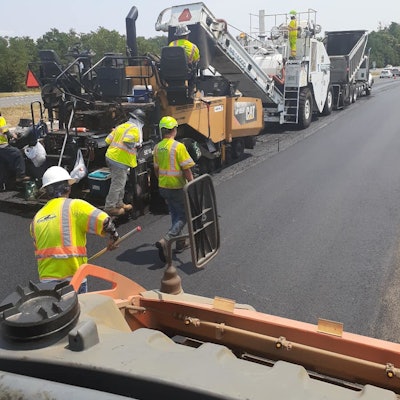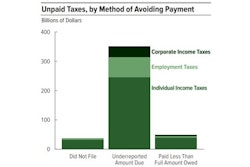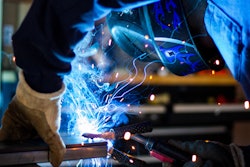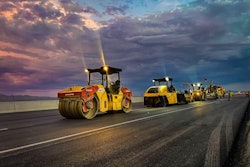
After weeks of debate, the Senate has agreed to take up talks on the $1.2 trillion bipartisan infrastructure package. The vote to advance the legislation was 67 to 32, with 17 Republicans joining all 50 Democrats voting in favor. Sixty votes were required to move the bill forward.
The wide-ranging infrastructure bill would provide about $550 billion in additional funds on top of existing spending, divided among major categories. The bipartisan infrastructure deal is slated to invest $110 billion of new funds for roads, bridges and major projects. Legislative text is still being written and should be released soon.
The bill also is set to reauthorize the surface transportation program for the next five years building on bipartisan surface transportation reauthorization bills passed out of committee earlier this year. The Senate Environment and Public Works Committee-passed Surface Transportation Reauthorization Act (STRA) of 2021, which calls for a five-year, $303.5 billion highway investment.
The bill includes a total of $40 billion of new funding for bridge repair, replacement and rehabilitation, which is the single largest dedicated bridge investment since the construction of the interstate highway system according to the White House fact sheet. The bill also includes a total of $17.5 billion for major projects that are too large or complex for traditional funding programs but will deliver significant economic benefits to communities.
The legislation includes:
- $40 billion for bridge repair, replacement and rehabilitation
- $66 billion investment in Amtrak passenger rail
- $39 billion for modernizing public transit and improving access for the elderly and people with disabilities
- $55 billion for clean water investments
- $65 billion in broadband internet deployment
- $7.5 billion to build electric vehicle chargers nationwide
Economy Set to Benefit
In the years ahead, the White House says the deal will generate significant economic benefits. With President Joe Biden's Build Back Better Agenda, these investments will add, on average, around 2 million jobs per year over the course of the decade, while accelerating America’s path to full employment and increasing labor force participation.
The Association of Equipment Manufacturers (AEM) released a new report this week that shows more than 100,000 family-sustaining equipment manufacturing jobs can be created before the end of President Biden’s first term in office. According to the data by IHS Markit, these are high-skilled jobs in primarily rural areas that pay an average annual income of $88,000, which is 35% above the current national average.
“The bipartisan infrastructure framework agreed to by the White House and a group of Senators, coupled with a five-year surface transportation reauthorization, is vital for the 2.8 million men and women of the equipment manufacturing industry, for their families and communities, for the U.S. economy, and for bipartisanship in this country," said Kip Eideberg, AEM senior vice president of government and industry relations. "The data shows that it would also create nearly 500,000 new manufacturing jobs overall, generate over $2 billion in new federal, state, and local tax revenue from the equipment manufacturing industry, and result in an additional $27 billion in overall economic output. It is time for policymakers on both sides of the aisle to put policy ahead of politics and pass the bipartisan infrastructure framework and secure a five-year surface transportation reauthorization as soon as possible.”
The bill will be financed through a combination of redirecting unspent emergency relief funds, targeted corporate user fees, strengthening tax enforcement when it comes to crypto currencies, and other bipartisan measures, in addition to the revenue generated from higher economic growth as a result of the investments.
Industry Reacts to Positive Step Forward
The procedural agreement to advance the proposed bipartisan infrastructure proposal garnered immediate positive responses from around the construction sector.
AASHTO executive director Jim Tymon said: "We are particularly grateful for the addition of $550 billion in new funding on top of the much-needed five-year surface transportation reauthorization bills passed with strong bipartisan support by the Senate Environment and Public Works and Commerce Committees. AASHTO and our state department of transportation members stand ready to work with Congress and the Administration toward enactment of this major infrastructure package as soon as possible.”
The U.S. Chamber of Commerce, who has been pressing lawmakers to act, issued the following statement:
"We applaud the bipartisan group of Senators -- led by Senators Portman and Sinema -- who worked tirelessly to achieve agreement on this much needed infrastructure proposal. The investment included in this agreement will provide enormous benefits for the American people and the economy. Our nation has been waiting for infrastructure modernization for over a decade, and this is a critical step in the process. We now urge the full Senate to vote yes on the cloture motion to proceed to consideration so infrastructure legislation can be approved before the August recess.”
The Senate vote is the first step in a process that sets up a final vote on the package in the coming days. Once the Senate passes the measure, the package will go to the House for approval or to make changes and send back to the Senate. Senate Democrats continue to insist that the bipartisan infrastructure framework be considered and passed along with a $3.5 trillion social spending package before the August recess. While the bipartisan plan would require 60 votes to pass in the U.S. Senate, Senate Democrats will seek to pass the social spending package through the budget reconciliation process, which only requires 50 votes.
Of note, House Speaker Nancy Pelosi (D-CA) has reiterated that the House will not take up either the bipartisan framework or the reconciliation package until the Senate passes both measures.




















